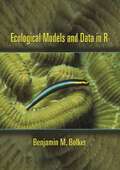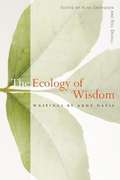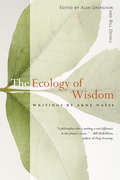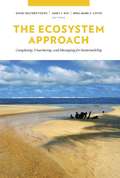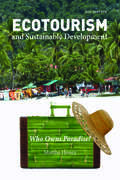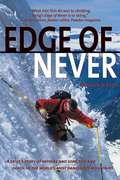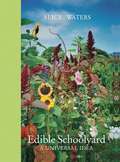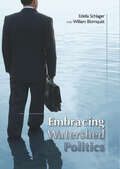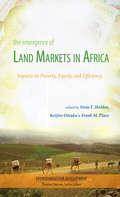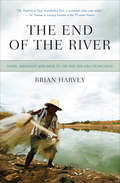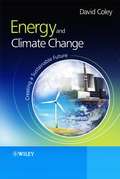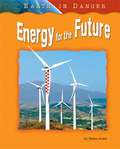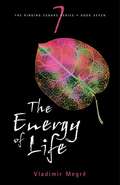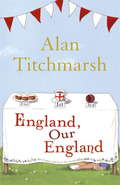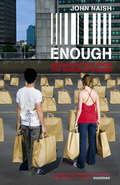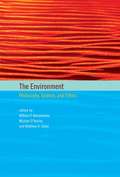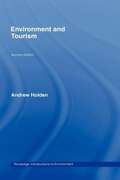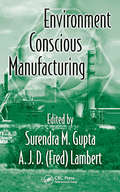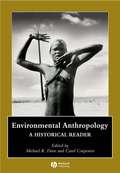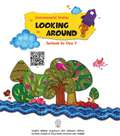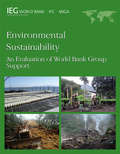- Table View
- List View
Ecological Models and Data in R
by Benjamin M. BolkerEcological Models and Data in R is the first truly practical introduction to modern statistical methods for ecology. In step-by-step detail, the book teaches ecology graduate students and researchers everything they need to know in order to use maximum likelihood, information-theoretic, and Bayesian techniques to analyze their own data using the programming language R. Drawing on extensive experience teaching these techniques to graduate students in ecology, Benjamin Bolker shows how to choose among and construct statistical models for data, estimate their parameters and confidence limits, and interpret the results. The book also covers statistical frameworks, the philosophy of statistical modeling, and critical mathematical functions and probability distributions. It requires no programming background--only basic calculus and statistics. Practical, beginner-friendly introduction to modern statistical techniques for ecology using the programming language R Step-by-step instructions for fitting models to messy, real-world data Balanced view of different statistical approaches Wide coverage of techniques--from simple (distribution fitting) to complex (state-space modeling) Techniques for data manipulation and graphical display Companion Web site with data and R code for all examples
Ecology of Wisdom: Writings
by Arne NaessA founder of the Deep Ecology Movement, Arne Naess' has produced articles on environmentalism that have provided unmatched inspiration for ecologists, philosophers, and activists worldwide. This collection amasses a definitive group of Naess' most important works in which he calls for nonviolent, cooperative action to protect the Earth. Rich with observations, insights, and anecdotes, Naess' writings draw from Eastern religious practices, Gandhian nonviolent direct action, and Spinozan unity systems. Playful and compassionate in tone, Ecology of Wisdom showcases Naess' exceptional enthusiasm, wit, and spiritual fascination with nature, while educating each of us about the steps we must take to rescue the planet and illuminating the relevance of this important environmental advocate.
The Ecology of Wisdom: Writings by Arne Naess
by Arne Naess Bill Devall Alan DrengsonA founder of the Deep Ecology Movement, Arne Naess' has produced articles on environmentalism that have provided unmatched inspiration for ecologists, philosophers, and activists worldwide. This collection amasses a definitive group of Naess' most important works in which he calls for nonviolent, cooperative action to protect the Earth. Rich with observations, insights, and anecdotes, Naess' writings draw from Eastern religious practices, Gandhian nonviolent direct action, and Spinozan unity systems. Playful and compassionate in tone, Ecology of Wisdom showcases Naess' exceptional enthusiasm, wit, and spiritual fascination with nature, while educating each of us about the steps we must take to rescue the planet and illuminating the relevance of this important environmental advocate.
The Ecosystem Approach: Complexity, Uncertainty, and Managing for Sustainability
by James J. Kay Nina-Marie E. Lister David Waltner-ToewsIs sustainable development a workable solution for today's environmental problems? Is it scientifically defensible? Best known for applying ecological theory to the engineering problems of everyday life, the late scholar James J. Kay was a leader in the study of social and ecological complexity and the thermodynamics of ecosystems. Drawing from his immensely important work, as well as the research of his students and colleagues, The Ecosystem Approach is a guide to the aspects of complex systems theories relevant to social-ecological management. Advancing a methodology that is rooted in good theory and practice, this book features case studies conducted in the Arctic and Africa, in Canada and Kathmandu, and in the Peruvian Amazon, Chesapeake Bay, and Chennai, India. Applying a systems approach to concrete environmental issues, this volume is geared toward scientists, engineers, and sustainable development scholars and practitioners who are attuned to the ideas of the Resilience Alliance-an international group of scientists who take a more holistic view of ecology and environmental problem-solving. Chapters cover the origins and rebirth of the ecosystem approach in ecology; the bridging of science and values; the challenge of governance in complex systems; systemic and participatory approaches to management; and the place for cultural diversity in the quest for global sustainability.
Ecotourism and Sustainable Development, Second Edition: Who Owns Paradise?
by Martha HoneyEcotourism and Sustainable Development is the most comprehensive overview of worldwide ecotourism available today, showing how both the concept and the reality have evolved over more than twenty-five years. Here Martha Honey revisits six nations she profiled in the first edition--the Galapagos Islands, Costa Rica, Tanzania, Zanzibar, Kenya, and South Africa--and adds a fascinating new chapter on the United States. She examines the growth of ecotourism within each country's tourism strategy, its political system, and its changing economic policies. Her useful case studies highlight the economic and cultural impacts of expanding tourism on indigenous populations as well as on ecosystems.
The Edge of Never: A Skier's Story of Life, Death, and Dreams in the World's Most Dangerous Mountains
by William A. KerigIn the world of big-mountain skiing, Trevor Petersen was a legend. Appearing in countless films, magazines and photo shoots, his ponytail flying behind him, he was the very embodiment of the freewheeling spirit of extreme skiing in the 1980s and early '90s. Then it all came to an end. On February 26, 1996, while skiing in Chamonix, France - the so-called Death Sport Capital of the World - an avalanche swept Trevor away. His body was found sitting up in the snow as if gazing at the mountains he loved. Nearly a decade later, Trevor's fifteen-year-old son, Kye Petersen, a rising star in his own right, traveled to Chamonix to ski the run that took his father's life and, with the aid of some of the world's greatest ski mountaineers, to become a member of skiing's big-mountain tribe. There to chronicle Kye's story was William A. Kerig, a filmmaker with a dream of his own - to create a film about the soul of big-mountain skiing and the band of mountaineers who ski the steepest, wildest, most dangerous terrain in the world. In The Edge of Never, Kerig gives us not only a ripping adventure tale about a young man coming of age but a frank and subtle portrait of the extreme skiers who "live big" in the face of death and risk everything to experience the fullness of life in the mountains.
Edible Schoolyard: A Universal Idea
by Alice Waters David Liittschwager Daniel DuaneOne of America's most influential chefs, Alice Waters created a revolution in 1971 when she introduced local, organic fare at her Berkeley, California, restaurant, Chez Panisse. Twenty-five years later, she and a small group of teachers and volunteers turned over long-abandoned soil at an urban middle school in Berkeley and planted the Edible Schoolyard. The schoolyard has since grown into a universal idea of Edible Education that integrates academics with growing, cooking, and sharing wholesome, delicious food. With inspiring images of the garden and kitchen and their young caretakers. Edible Schoolyard is at once a visionary model for sustainable farming and childhood nutrition, and a call to action for schools across the country.
Embracing Watershed Politics
by Edella SchlagerAs Americans try to better manage and protect the natural resources of our watersheds, is politics getting in the way? Why does watershed management end up being so political? In Embracing Watershed Politics, political scientists Edella Schlager and William Blomquist provide timely illustrations and thought-provoking explanations of why political considerations are essential, unavoidable, and in some ways even desirable elements of decision making about water and watersheds. With decades of combined study of water management in the United States, they focus on the many contending interests and communities found in America's watersheds, the fundamental dimensions of decision making, and the impacts of science, complexity, and uncertainty on watershed management. Enriched by case studies of the organizations and decision making processes in several major U.S. watersheds (the Delaware River Basin, San Gabriel River, Platte River, and the Columbia River Basin), Embracing Watershed Politics presents a reasoned explanation of why there are so few watershed-scale integrated management agencies and how the more diverse multi-organizational arrangements found in the vast majorities of watersheds work. Although the presence of multiple organizations representing a multitude of communities of interest complicates watershed management, these institutional arrangements can-under certain conditions-suit the complexity and uncertainty associated with watershed management in the twenty-first century.
The Emerald Horizon: The History of Nature in Iowa
by Cornelia F. MutelBeginning with the geological forces that shaped the land, Mutel traces the evolution of Iowa's prairies and woodlands to the present time. She emphasizes the dramatic impact of Euro-American settlement and shows how farming and logging have destroyed fragile prairie and forest abitats. She discusses the potential of restoration and provides information for those who wish to launch restoration programs. The issues prominent in Iowa mirror those to be encountered in other prairie states.
The Emerald Tablet (The Forgotten Worlds #1)
by P. J. HooverBenjamin and his best friend Andy love being different from the other kids. They like being able to read each others mind and use their telekinesis to play tricks. In fact, they are getting set to spend their entire summer doing just that when Benjamin's mirror starts talking.
The Emergence of Land Markets in Africa: Impacts on Poverty, Equity, and Efficiency (Environment for Development)
by Keijiro Otsuka Stein T. Holden Frank M. PlaceThis book is the first systematic attempt to address emerging land markets and their implications for poverty, equity, and efficiency across a number of African countries. The high incidence of poverty and the need for increased agricultural productivity remain acute in rural areas of sub-Saharan Africa, where a lack of secure land rights and a growing scarcity of land relative to the size of the population are becoming increasingly critical issues. Indeed, land issues in the region are high on the international policy agenda. Yet our knowledge about land tenure security and other rural factor markets (such as labor, oxen, manure, purchased inputs, and credit) is far from adequate to formulate sensible policies. The case studies in the book show that, while land markets and especially informal markets have been rapidly emerging in densely populated parts of Africa - and have generally been to the benefit of the poor--their functions remain imperfect. This is due to policy-induced tenure insecurity and the fragmentation of agricultural land. Applying rigorous quantitative analyses, the book provides a basis for taking into account the role of land markets in national land policies. All too often, the authors argue, land policies have been extreme, either prohibiting all land transactions or giving unrestricted freehold rights to a small elite at the expense of the poor. From the long experience in Asia, it is known that such policies are detrimental to both production efficiency and equity of land use. The authors argue that future policies in Africa should work with the markets. Regulations should be imposed only with careful testing that they are having the intended effects. The Emergence of Land Markets in Africa is a resource for teaching in developed and developing countries, as it provides both comprehensive reviews of the literature and detailed case studies. It is intended to facilitate the dialogue between researchers and policymakers, as well as inspire researchers to go further in their investigations and build an even stronger basis for good policies. The Emergence of Land Markets in Africa is the first publication in the new Environment for Development (EfD) book series. EfD books focus on research and applications in environmental and natural resource economics as they are relevant to poverty reduction and environmental problems in developing countries. The EfD book series is part of the EfD initiative. (www.environmentfordevelopment.org)
The End of the River: Dams, Drought and Déjà Vu on the Rio São Francisco
by Brian Harvey“[Harvey] may have created a new literary genre: science travel writing . . . travelogue, autobiography, history, and even fantasy romp alongside the biology” (Quill & Quire). When biologist Brian Harvey saw a thousand fish blundering into a Brazilian dam, he asked the obvious: What’s going to happen to them? The End of the River is the story of his long search for an answer. Harvey takes readers from a fisheries patrol boat on the Fraser River to the great Tsukiji fish market in Japan, with stops in the Philippines, Thailand, and assorted South American countries. Finally, in the arid outback of northeast Brazil, against a backdrop of a multi-billion-dollar river project nobody seems to want, he finds a small-scale answer to his simple question. In recounting his journey, he populates his story with characters both real and imagined, human and otherwise—a six-foot endangered catfish; a Canadian professor with a weakness for Thai bar girls; a chain-smoking Brazilian with a passion for her river; a drug-addled stick-up artist. The End of the River is about fishermen, fish farmers, and fish cops; there are scientists and shysters as well as a few Colombian narcotráficos and some very drunk, very hairy Brazilian men in thongs. From the founder of the World Fisheries Trust, Harvey introduces a new kind of writing about the environment, as far off the beaten track as you can get in a Land Rover driven by a female Colombian biologist whose favorite expression is “No hay via!”—meaning, “no road!” “[A] freewheeling and vividly written essay on the mysteries and longings of what it is to be human in a world of cynicism and loss—and more significantly, what it is to be hopeful, to persevere, in the search for redemption and beauty . . . A brilliant and instructive book . . . recalls the travel writing of one of Harvey’s heroes, Sir Richard Burton.” —The Globe and Mail (Toronto)
Endowed: Regulating the Male Sexed Body
by Michael ThomsonFeminist legal scholars and health care lawyers have long engaged with law’s responses to the female reproductive body, especially on what the legal regulation of women’s reproductive lives can tell us about the broader relationship between law and gender. Acknowledging this work and building upon it, Endowed considers the interaction of law and ideas of male reproductivity. In particular, it seeks to uncover what these regulatory moments can tell us about contemporary ideas and ideals of masculinity and the male sexed body. Spanning topics such as male circumcision and the regulation of state access to Viagra, the book uncovers recurring motifs that define masculinity and the male body in the legal imagination. In looking to these understandings the book engages with broader questions regarding the relationship between law and gender and between masculinity and social organization.
Energy and Climate Change
by David ColeyFor more information on this title, including student exercises, please visit , http://www.people.ex.ac.uk/DAColey/Energy and Climate Change: Creating a Sustainable Future provides an up-to-date introduction to the subject examining the relationship between energy and our global environment. The book covers the fundamentals of the subject, discussing what energy is, why it is important, as well as the detrimental effect on the environment following our use of energy. Energy is placed at the front of a discussion of geo-systems, living systems, technological development and the global environment, enabling the reader to develop a deeper understanding of magnitudes.Learning is re-enforced, and the relevance of the topic broadened, through the use of several conceptual veins running through the book. One of these is an attempt to demonstrate how systems are related to each other through energy and energy flows. Examples being wind-power, and bio-mass which are really solar power via another route; how the energy used to evaporate sea water must be related to the potential for hydropower; and where a volcano's energy really comes from.With fermi-like problems and student exercises incorporated throughout every chapter, this text provides the perfect companion to the growing number of students taking an interest in the subject.
Energy for the Future (Earth in Danger)
by Helen OrmeBurning fossil fuels, such as oil and coal, may be accelerating Earth's climate change. How can we develop clean, renewable sources of energy and reduce our dependence on fossil fuels? Energy for the Future clearly presents the pros and cons of alternative energy sources-- from wind, water, and solar power to bio-fuels, hydrogen fuel cells, and nuclear power. A section in the back of the book will inspire young environmentalists by suggesting ways they can help protect their planet.
The Energy of Life (The Ringing Cedars Series #7)
by Vladimir Megré John Woodsworth Leonid SharashkinMan's life! On what or on whom does it depend? Why do some become emperors or regimental commanders, while others are obliged to fend for scraps at garbage dumps? One opinion holds that each person's fate is pre-determined from birth. That would make Man nothing more than an insignificant cog in some mechanised system, and not the highly organised creation of God.
England, Our England
by Alan TitchmarshAn anthology and miscellany of everything an Englishman should know: From Austen to Wordsworth,Jerusalem to the Scout?s Honour, Kings and Queens of England to Land of Hope and Glory, Savile Row tailors to Jermyn St Shirt Makers, Tying a Windsor knot to making a pot of tea, Victoria sponge to fish pie and the rules of cricket to Gilbert and Sullivan operas
Enough
by John NaishFor millions of years, humankind has used a brilliantly successful survival strategy. If we like something, we chase after more of it: more status, more food, more info, more stuff. Then we chase again. Its how we survived famine, disease and disaster to colonise the world. But now, thanks to technology, weve suddenly got more of everything than we can ever use, enjoy or afford. That doesnt stop us from striving though and its making us sick, tired, overweight, angry and in debt. It burns up our personal ecologies and the planets ecology too. We urgently need to develop a sense of enough. Our culture keeps telling us that we dont yet have all we need to be happy, but in fact we need to nurture a new skill the ability to bask in the bounties all around us. ENOUGH explores how our Neolithic brain-wiring spurs us to build a world of overabundance that keeps us hooked on more. John explains how, through adopting the art of enoughness, we can break from this wrecking cycle. With ten chapters on topics such as Enough food, Enough stuff, Enough hurry and Enough information, he explores how we created the problem and gives us practical ways to make our lives better.
Enough
by John NaishFor millions of years, humankind has used a brilliantly successful survival strategy. If we like something, we chase after more of it: more status, more food, more info, more stuff. Then we chase again. Its how we survived famine, disease and disaster to colonise the world. But now, thanks to technology, weve suddenly got more of everything than we can ever use, enjoy or afford. That doesnt stop us from striving though and its making us sick, tired, overweight, angry and in debt. It burns up our personal ecologies and the planets ecology too. We urgently need to develop a sense of enough. Our culture keeps telling us that we dont yet have all we need to be happy, but in fact we need to nurture a new skill the ability to bask in the bounties all around us. ENOUGH explores how our Neolithic brain-wiring spurs us to build a world of overabundance that keeps us hooked on more. John explains how, through adopting the art of enoughness, we can break from this wrecking cycle. With ten chapters on topics such as Enough food, Enough stuff, Enough hurry and Enough information, he explores how we created the problem and gives us practical ways to make our lives better.
The Environment
by William P. Kabasenche Michael O'Rourke Matthew H. SlaterPhilosophical reflections on the environment began with early philosophers' invocation of a cosmology that mixed natural and supernatural phenomena. Today, the central philosophical problem posed by the environment involves not what it can teach us about ourselves and our place in the cosmic order but rather how we can understand its workings in order to make better decisions about our own conduct regarding it. The resulting inquiry spans different areas of contemporary philosophy, many of which are represented by the fifteen original essays in this volume. The contributors first consider conceptual problems generated by rapid advances in biology and ecology, examining such topics as ecological communities, adaptation, and scientific consensus. The contributors then turn to epistemic and axiological issues, first considering philosophical aspects of environmental decision making and then assessing particular environmental policies (largely relating to climate change), including reparations, remediation, and nuclear power, from a normative perspective.
Environment and Tourism (2nd Edition)
by Andrew HoldenThis second edition of Environment and Tourism reflects changes in the relationship between tourism, society and the natural environment in the first decade of the new century. Alongside the updating of all statistics, environmental policy initiatives, examples and case studies new material has been added. This includes two new chapters: one on climate change and natural disasters and the other on the relationship between tourism and poverty. These themes have direct relevance, not only to tourism, but are reflective of the wider relationship between nature and society, a thesis that contextualizes this book. Tourism is also analyzed as an interconnected system, linking the environments of where tourists come from, with the ones they go to. Taking a holistic view of the tourism system and how it interacts with the natural environment, this volume illustrates the positive and negative effects of this relationship, and importantly how tourism can be planned and managed to encourage natural resource conservation and aid human development. It is an invaluable tool for all those studying human geography, tourism and environment studies.
Environment Conscious Manufacturing
by Surendra M. Gupta A. J. D. Fred LambertHotter temperatures, less arctic ice, loss of habitat-every other day, it seems, global warming and environmental issues make headlines. Consumer-driven environmental awareness combined with stricter recycling regulations have put the pressure on companies to produce and dispose of products in an environmentally responsible manner. Redefining indus
Environmental Anthropology: A Historical Reader
by Michael R. Dove Carol CarpenterEnvironmental Anthropology: A Reader is a collection of historically significant readings, dating from early in the twentieth century up to the present, on the cross-cultural study of relations between people and their environment. Provides the historical perspective that is typically missing from recent work in environmental anthropology Includes an extensive intellectual history and commentary by the volume's editors Offers a unique perspective on current interest in cross-cultural environmental relations Divided into five thematic sections: (1) the nature/culture divide; (2) relationship between environment and social organization; (3) methodological debates and innovations; (4) politics and practice; and (5) epistemological issues of environmental anthropology Organized into a series of paired papers, which 'speak' to each other, designed to encourage readers to make connections that they might not customarily make
Environmental Studies: Looking Around class 5 - NCERT - 23
by National Council of Educational Research and TrainingThis a textbook for Class V Environmental Studies, published by the National Council of Educational Research and Training (NCERT) in India. It covers six themes related to the natural and social environment of children, such as family and friends, food, water, shelter, travel, and things we make and do. The textbook aims to link children’s life at school with their life outside the school, and to encourage them to observe, explore, question, and experiment with their surroundings. The textbook also tries to develop children’s sensitivity towards the diversity and interdependence of life forms, and to foster a concern for justice and equality in society. The textbook consists of 22 chapters, each with activities, illustrations, and questions for assessment. The textbook follows the guidelines of the National Curriculum Framework (2005) and the syllabus designed by NCERT for primary level education.
Environmental Sustainability: An Evaluation of World Bank Group Support
by World BankThis evaluation assesses the Bank Group's support for environmental sustainability in both the public and private sectors over the past 15 years. It identifies several crucial constraints that need to be addressed, perhaps most importantly insufficient government commitment to environmental goals and weak institutional capacity to deal with them. But constraints within the Bank Group, including insufficient attention to longer-term sustainable development, must be reduced as well. The Bank Group needs improved systems in place--across the World Bank, IFC, and MIGA--to monitor environmental outcomes and to assess impacts. Better coordination among the three parts of the Bank Group is also among the key challenges.
